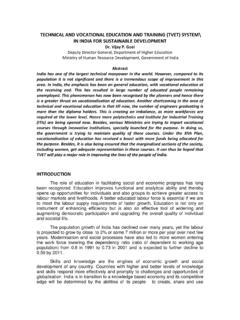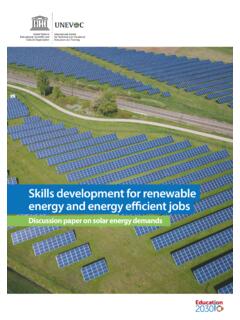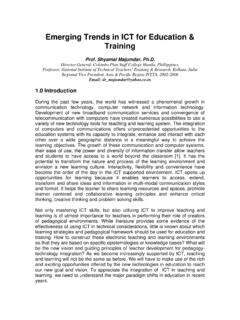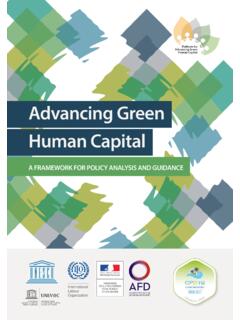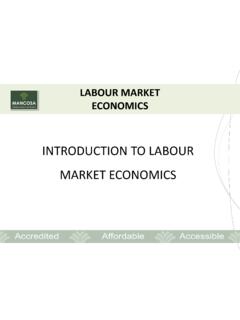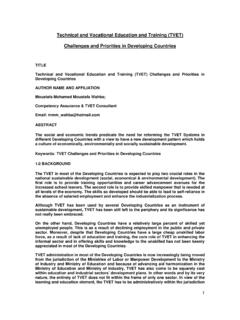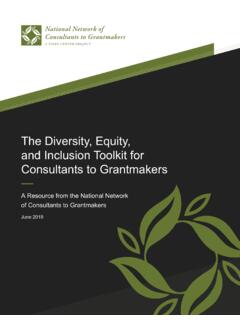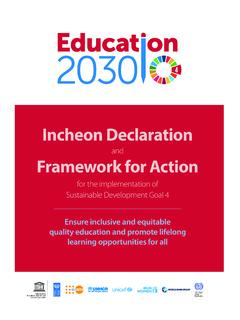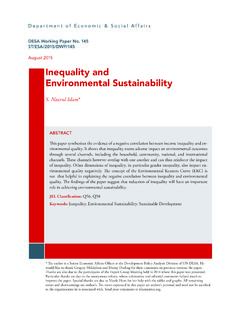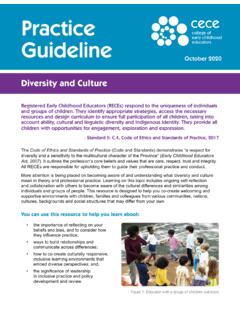Transcription of Educational, Scientific and Cultural Organization ...
1 UNESCO. Publishing United Nations educational , Scienti c and Cultural Organization Rethinking Education W. e are living in a world characterized by change, complexity and paradox. Economic growth and the creation of wealth have cut global poverty rates, yet vulnerability, inequality, Towards a global common good? exclusion and violence have escalated within and across societies throughout the world. Unsustainable patterns of economic production and consumption promote global warming, environmental degradation and an upsurge in natural disasters. Moreover, while we have strengthened international human rights frameworks over the past several decades, implementing and protecting these norms remains a challenge. And while technological progress leads to greater interconnectedness and offers new avenues for exchange, cooperation and solidarity, we also see proliferation of Cultural and religious intolerance, identity-based political mobilization and conflict.
2 These changes signal the emergence of a new global context for learning that has vital implications for education. Rethinking the purpose of education and the Organization of learning has never been more urgent. This book is intended as a call for dialogue. It is inspired by a humanistic vision of education and development, based on respect for life and human dignity, equal rights, social justice, Cultural diversity , international solidarity and shared responsibility for a sustainable future. It proposes that we consider education and knowledge as global common goods, in order to reconcile the purpose and Organization of education as a collective societal endeavour in a complex world. Education Sector United Nations educational , Scienti c and 9 789231 000881. Cultural Organization Rethinking Education Towards a global common good? Published in 2015 by the United Nations educational , Scientific and Cultural Organization , 7, place de Fontenoy, 75352 Paris 07 SP, France UNESCO 2015 .
3 ISBN 978-92-3-100088-1. This publication is available in Open Access under the Attribution-ShareAlike IGO (CC-BY-SA IGO) license ( ). By using the content of this publication, the users accept to be bound by the terms of use of the UNESCO Open Access Repository ( terms-use-ccbysa-en). The designations employed and the presentation of material throughout this publication do not imply the expression of any opinion whatsoever on the part of UNESCO concerning the legal status of any country, territory, city or area or of its authorities, or concerning the delimitation of its frontiers or boundaries. The members of the Senior Experts' Group are responsible for the choice and the presentation of the facts contained in the publication and for the opinions expressed therein. These are not necessarily those of UNESCO and do not commit the Organization . Graphic design: UNESCO. Cover photo credit: Shutterstock / Arthimedes Printed by UNESCO. Printed in France Foreword What education do we need for the 21st century?
4 What is the purpose of education in the current context of societal transformation? How should learning be organized? These questions inspired the ideas presented in this publication. In the spirit of two landmark UNESCO publications, Learning to Be: The world of education today and tomorrow (1972), the Faure Report', and Learning: The treasure within (1996), the Delors Report,' I am convinced we need to think big again today about education. For these are turbulent times. The world is getting younger, and aspirations for human rights and dignity are rising. Societies are more connected than ever, but intolerance and conflict remain rife. New power hubs are emerging, but inequalities are deepening and the planet is under pressure. Opportunities for sustainable and inclusive development are vast, but challenges are steep and complex. The world is changing education must also change. Societies everywhere are undergoing deep transformation, and this calls for new forms of education to foster the competencies that societies and economies need, today and tomorrow.
5 This means moving beyond literacy and numeracy, to focus on learning environments and on new approaches to learning for greater justice, social equity and global solidarity. Education must be about learning to live on a planet under pressure. It must be about Cultural literacy, on the basis of respect and equal dignity, helping to weave together the social, economic and environmental dimensions of sustainable development. This is a humanist vision of education as an essential common good. I believe this vision renews with the inspiration of the UNESCO Constitution, agreed 70 years ago, while reflecting new times and demands. Education is key to the global integrated framework of sustainable development goals. Education is at the heart of our efforts both to adapt to change and to transform the world within which we live. A quality basic education is the necessary foundation for learning throughout life in a complex and rapidly changing world.
6 3. Across the world, we have seen great progress in expanding learning opportunities for all. Yet we must draw the right lessons to chart a new course forward. Access is not enough; we need a new focus on the quality of education and the relevance of learning, on what children, youth and adults are actually learning. Schooling and formal education are essential, but we must widen the angle, to foster learning throughout life. Getting girls into primary school is vital, but we must help them all the way through secondary and beyond. We need an ever stronger focus on teachers and educators as change agents across the board. There is no more powerful transformative force than education to promote human rights and dignity, to eradicate poverty and deepen sustainability, to build a better future for all, founded on equal rights and social justice, respect for Cultural diversity , and international solidarity and shared responsibility, all of which are fundamental aspects of our common humanity.
7 This is why we must think big again and re-vision education in a changing world. For this, we need debate and dialogue across the board, and that is the goal of this publication to be both aspirational and inspirational, to speak to new times. Irina Bokova Director-General of UNESCO. 4. Acknowledgements I am pleased to see this publication released at this particular historical juncture when the international education and development community moves towards the global framework of Sustainable Development Goals. The present publication is the result of my early discussions with Ms Irina Bokova, Director-General of UNESCO, during her first mandate. She strongly supported the idea of reviewing the Delors Report' in order to identify future orientations of global education. She wisely wished to demonstrate that, beyond its lead technical role in the Education for All movement, UNESCO also has an important intellectual leadership role in international education.
8 It is in this perspective that the Director-General of UNESCO established a Senior Experts' Group to rethink education in a changing world. The group of international experts was tasked with preparing a succinct document that identified issues likely to affect the Organization of learning and to stimulate debate on a vision for education. The group was co-chaired by Ms Amina J. Mohammed, Special Advisor to the United Nations Secretary-General on Post- 2015 Development Planning and Assistant Secretary-General, and Professor W. John Morgan, UNESCO Chair at the University of Nottingham, in the United Kingdom. Other members of the Senior Experts'. Group included: Mr Peter Ronald DeSouza, Professor at the Centre for the Study of Developing Societies, New Delhi, India; Mr Georges Haddad, Professor at Universit . Paris 1 Panth on-Sorbonne, France; Ms Fadia Kiwan, Director Emeritus of the Institut des Sciences Politiques at Universit Saint-Joseph in Beirut, Lebanon; Mr Fred van Leeuwen, Secretary-General of Education International; Mr Teiichi Sato, Professor at the International University of Health and Welfare in Japan; and Ms Sylvia Schmelkes, President of the National Institute for the Evaluation of Education in Mexico.
9 From the outset, the Director-General gave the UNESCO Education Sector strong support to undertake this project. Coordinated by the Education Research and Foresight team, the Group met in Paris in February 2013, February 2014, and December 2014 to develop their ideas and debate successive drafts of their text. I would like to take this opportunity to sincerely thank all the members of the Senior Experts' Group for their 5. invaluable contribution to this important collective endeavour. The UNESCO Education Sector is very grateful for their efforts and commitment. This publication would not have been possible without the contribution of numerous people, external experts as well as UNESCO colleagues. I would like to acknowledge and thank them for their support: Abdeljalil Akkari (University of Geneva), Massimo Amadio (UNESCO International Bureau of Education), David Atchoarena (UNESCO. Division for Policies and Lifelong Learning Systems), Sylvain Aubry (Global Initiative for Economic, Social and Cultural Rights), N jib Ayed (Arab League educational , Cultural and Scientific Organization ), Aaron Benavot (Education for All Global Monitoring Report), Mark Bray (University of Hong Kong), Arne Carlsen (UNESCO.)
10 Institute for Lifelong Learning), Michel Carton (Network of International Policies and Cooperation in Education and Training), Borhene Chakroun (UNESCO Section for Youth, Literacy and Skills Development), Kai-ming Cheng (University of Hong Kong), Maren Elfert (University of British Columbia), Paulin J. Hountondji (National Council of Education of Benin), Klaus H fner (Freie Universit t Berlin), Ruth Kagia (Results for Development), Taeyoung Kang (POSCO Research Institute, Seoul), Maria Khan (Asia South Pacific Association for Basic and Adult Education), Val rie Leichti (Swiss Agency for Development Cooperation), Candy Lugas (UNESCO International Institute for educational Planning), Ian Macpherson (Open Society Foundations), Rolla Moumne Beulque (UNESCO Section of Education Policy), Renato Opertti (UNESCO International Bureau of Education), Svein Osttveit (Executive Office, UNESCO Education Sector), David Post (Education for All Global Monitoring Report), Sheldon Shaeffer (Specialist on Early Childhood Education and Governance), Dennis Sinyolo (Education International), and Rosa-Maria Torres (Instituto Fronesis, Quito).
